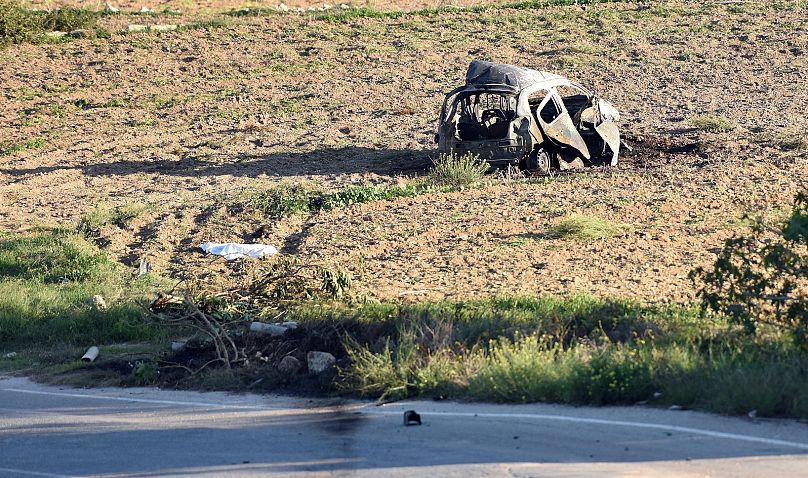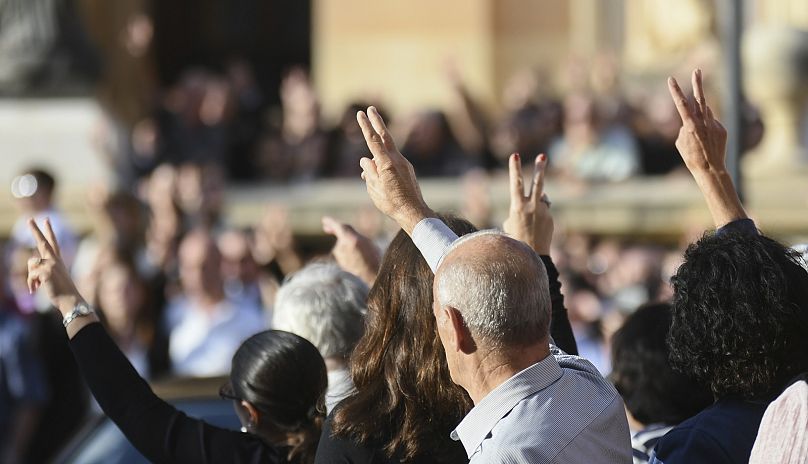Investigative journalist Daphne Caruana Galizia was killed when a bomb planted in her car detonated. The fight to uncover the truth behind her murder and closure for her family continues to shake Malta to its foundations.
It's three years since investigative journalist Daphne Caruana Galizia was killed when a bomb was remotely detonated underneath her car.
Her murder on a quiet country road in Malta on October 16, 2017, sent shockwaves through the country, home to less than half a million people, and attracted widespread international condemnation.
"We knew instantly that this was a lot more than other people would have imagined. It wasn’t some random person taking revenge," Corinne Vella, Caruana Galizia's sister, told Euronews in an interview to mark the anniversary.
"If you wanted to do that, you’d use a different method altogether. This was an extreme act of impunity and it took place in broad daylight."
Three years on, her family are still searching for answers as to who carried out her murder - and who ordered the hit. With arrests made - including that of businessman Yorgen Fenech in November 2019 who police believe masterminded the killing - but no prosecutions to date, the pursuit for justice has become a war of attrition.
"It’s not going to be served without a fight. That’s something we’re certain of. We can’t just sit back and wait for justice to be served," said Vella. "If it were that simple, Daphne would not have been killed in the first place."
'One-woman WikiLeaks'
Caruana Galizia's reporting alleged dirty money scandals, organised crime, and corruption in the highest echelons of government in the small Mediterranean island nation. Her investigative journalism earned her the epithet as a "one-woman WikiLeaks" but in turn, made powerful enemies and exposed her to danger.
At the time of her death, she was fighting over 40 defamation suits. She had been arrested twice. Was Caruana Galizia fazed by the constant intimidation, legal battles, and threats of arrest and physical harm she faced?
"Reporting is a compulsion. You can no more keep a journalist away from journalism than you can keep a pianist away from a piano. Eventually, you’re going to want to play, you’re going to want to write. No matter what is happening, that instinct is there and you’re going to try to push through it," Vella said.
"But the other thing about threats is that people imagine this scenario where someone picks up the phone and calls you and says ‘if you don’t shut up, I’m going to kill you.’ It doesn’t work like that – it’s a lot more subtle, particularly with political corruption... The threats are hanging there in the air; the constant isolation, the constant demonisation, dehumanisation, being set up as a target."
For the best part of 30 years, Caruana Galizia singlehandedly spoke truth to power through investigations published on her popular blog Running Commentary, and in her newspaper columns.
One of her last investigations centred on allegations that then Economy Minister, Christian Cardona had visited a brothel on a trip to a conference in Germany. She also famously exposed Maltese links to off-shore companies, which were later confirmed in the Panama Papers leak, putting Konrad Mizzi, a government minister, Keith Schembri, the chief of staff of prime minister Joseph Muscat, as well as the premier's wife Michelle, who also had links to an off-shore Panamanian company, in her crosshairs.
"It’s too soon to say that corruption is coming to a head. Nobody has been prosecuted for political corruption, not so far. The same networks of power still exist; it will take time to wipe those out," Vella told Euronews.
Press freedom under threat
As well as systemic corruption, other democratic norms, such as freedom of the press, were called into question with the targeting of Caruana Galizia.
Just days before she was killed, she expressed concerns in an interview with a Council of Europe researcher that other journalists were being deterred from carrying out similar investigations because they saw how she was treated by the Maltese authorities.
Vella is optimistic though that her sister's murder did not have the effect of silencing the press.
“I wish she could have been alive to see what’s happening because actually many journalists have taken up where she left off, and they’re doing that in an environment where we now know for certain that you can be killed for what you do," said Vella. "Whereas before it was a supposition, a possibility, now it is a certainty."
"People sometimes forget there is an important role that journalists play, whether we like what we read or not. It is essential," she added.
As well as journalists stepping into the breach locally, the Daphne Project, a consortium established in the wake of her murder, has brought together journalists from around the world, including from titles such as The Guardian, Le Monde, La Repubblica, New York Times and the Süddeutsche Zeitung, to work collaboratively to continue her investigative work.
In this way, her journalistic legacy lives on. The sense of loss though is palpable, and for Vella, her sister's absence is felt more keenly in the once commonplace, everyday gestures between siblings.
"One of the times it hits me hardest is when I see something I know would appeal to her sense of humour, I instinctively reach out to send her a WhatsApp and I can’t do that. I can’t," said Vella.
"It really hits home because there are some things which I can only say to her. Not because nobody else would get it; it’s just something that used to happen often and it’s just not there anymore."
People power
With Caruana Galizia's suspected killers yet to face justice, the family are left tending to open wounds that show little signs of healing.
Three men - brothers George and Alfred Degiorgio and Vincent Muscat - were charged with planting the bomb but will not face trial until next year. They all pleaded not guilty. A fourth man, Melvin Theuma, who has claimed to be the middleman in the contract killing of Caruana Galizia, has agreed to give testimony in exchange for immunity from prosecution. Courts are currently hearing evidence to decide whether Fenech, one of the island's most prominent businessmen, should stand trial after being charged with financing and organising the journalist's murder, claims he denies.
Given the size of Malta, close proximity to those responsible can be jarring for Caruana Galizia's loved ones.
"A small space makes a lot of things much more difficult. So, on a personal level, yes it is challenging but it would be wherever we are," Vella said. "What is good about being in a small space is that people can mobilise very quickly and a lot of people have done that."
"In our particular case, yes it’s going to be what you call I suppose, in a traditional sense, ‘people power’ that’s going to make a difference but it takes time to fix institutions. You don’t just need legal structures; you need an entire shift in mind-set and that takes a very long time."
In November 2019, Malta was rocked by popular protests which publicly called for the prime minister's resignation after close associates, including Schembri, were arrested and questioned over Caruana Galizia's murder. Muscat eventually gave in to demands to stand down, leaving office in January this year.
Even with public support helping to hold the powerful to account, closure will remain elusive for the family - for now, at least.
"There will not be a sense of closure until everyone is brought to justice, and that doesn’t mean just for Daphne’s murder. It also means for everybody she exposed," said Vella.
"She exposed corruption, she exposed crime. She exposed crime because she was covering politics as a commentator. She arrived at crime through politics so that shows you how tangled the web is."
Every weekday at 1900 CEST, Uncovering Europe brings you a European story that goes beyond the headlines. Download the Euronews app to get an alert for this and other breaking news. It's available on Apple and Android devices.













